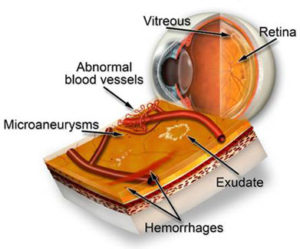Diabetic Retinopathy in Boca Raton & Palm Beach Gardens, FL
Diabetic retinopathy can lead to severe vision loss if it is not discovered and treated promptly.
At our offices we offer non-invasive painless testing to discover the early signs of this disease.
In less than a minute a finger print of your retina can be obtained by computer scanning (OCT) alerting us to the presence of this condition. An appropriate treatment plan to prevent damage to your sight can then be provided. Never before have we been able to help patients as well given the advances in treatment. Early diagnosis however is up to you. If you have diabetes then call us today to schedule this painless accurate screening test.

Diabetic retinopathy can be divided into non-proliferative and proliferative diseases.
- Non-proliferative disease:
Tiny blood vessels in the retina are damaged by diabetes that begin to leak and bleed. This leakage of fluid will cause the macula to swell and vision to be lost. - Proliferative disease:
In this advanced stage of diabetic retinopathy, abnormal and fragile blood vessels grow along the retina and in the vitreous. Without timely treatment, these new vessels bleed causing scar tissue to grow and can lead to blindness.
Symptoms:
Although early diabetic retinopathy is not associated with symptoms or pain, it is important to get a dilated eye examination annually. Fifty percent of Type I and Type II diabetics have some type of diabetic retinal disease.
As the disease progresses, blurred vision is an obvious sign that something is wrong inside the eye. Blurred vision occurs when the macula swells from leaking fluid. This is called macula edema and is an occular emergency.
Other equally serious symptoms of diabetic eye disease include the sudden appearance of black spots, known as “floaters”, in the line of vision.
If left untreated, diabetic retinopathy can cause permanent blindness.
Treatment Options:
No matter how good you are at controlling your blood sugar, the best way to take care of your eyes is to have a dilated eye exam annually. There are multiple treatment options depending on the severity of the disease.
